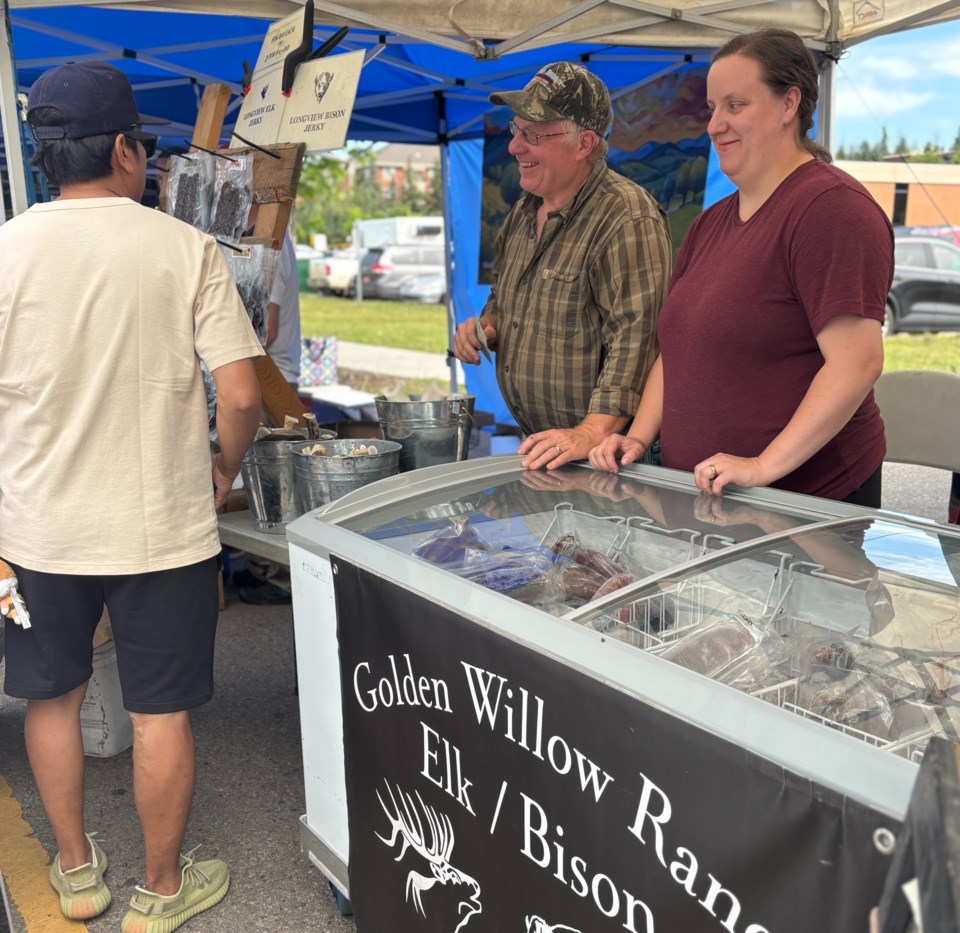The St. Albert Farmers' Market attracts vendors from diverse areas across the province. One case in point is Russell Gwozdz, a farmer located east of Red Deer near Clive, a two-hour drive to St. Albert.
Russell along with his wife, Joanne, and daughter, Rachelle, operate Golden Willow Ranch, a quarter section (160 acres). Currently, Gwozdz sells 50 elk and bison products including steaks, roasts, ribs, brisket, smokies, garlic rings, pepperoni and hamburger patties.
Golden Willow Ranch also houses a facility for making Super Dog Treats, a soft-chew holistic pet supplement made with ground elk velvet antler. The velvet antler treat is reputed to alleviate a series of health issues including joint mobility, lack of energy and arthritis.
Gwozdz was introduced to St. Albert Farmers Market eight years ago through his brother who lived in the area.
“It took about two years for people to get used to us, but we’re doing very well,” said Gwozdz.
Originally from the farming community of Eckville, Gwozdz opted to receive a post-secondary degree in chemistry. Following graduation in 1985, he was hired at NOVA Chemicals, an ethylene and polyethylene plant, in central Alberta.
Gwozdz spent 20 years at the facility before moving to Rahr Malting Co. He spent five years in quality control at the family owned company that distributes malt and related supplies to breweries and distilleries.
While off-farm income afforded a comfortable lifestyle, the salt of earth father of three also had family related priorities.
“I wanted to raise a family on a farm. I met my wife, we got married and we looked for a place on a farm,” said Gwozdz. “I’m all about morals, values and the strong work ethic of working on a farm. You don’t get that in the city. In the city, you work and go home and relax. In the country, you can’t do that. In the country you work until a job is done.”
The young couple was married in 1993 and by 1997 the duo had purchased what was to become Golden Willow Ranch.
“There was nothing," said Gwozdz. "I built buildings. I pounded posts. I build corrals and a barn. My dad was a carpenter and he helped out.”
Two years later, the couple purchased two elk after researching genetics. Continued research and high-quality breeding grew the herd to 200 head.
However, three years ago, Golden Willow Ranch suffered Chronic Wasting Disease (CWD), a fatal disease that affects the brain and spine of elk. In keeping with provincial and federal government regulations, the entire herd was destroyed.
“I cannot raise elk on this farm. They suspect it’s in the soil," Gwozdz said. "Even if I pass the farm onto my kids, they are not permitted to raise elk.”
The family took a huge financial hit and went into debt as the federal government compensated them for only one-third of the herd’s value. Gwozdz cited a particularly galling incident.
“I had a bull valued at $30,000 because of his genetics, but the government only paid me $2,000.”
Facing a financial crisis, the family gathered to discuss ways to keep the ranch operational and decided to transition to bison.
“Bison were originally my second choice when we went into elk farming," said Gwozdz. "At the time, some farmers were raising wood bison. Some were raising plains bison. We decided to mix the two to make a superior animal.”
Currently, the 50-head bison herd is thriving and has become a popular addition to market shoppers. As for elk products sold at the market booth. Gwozdz is complying with government regulations. A neighbour who lives 30 minutes away from Golden Willow Ranch raises elk for Gwozdz.
“My health, my family, my God is what keeps me going.”




